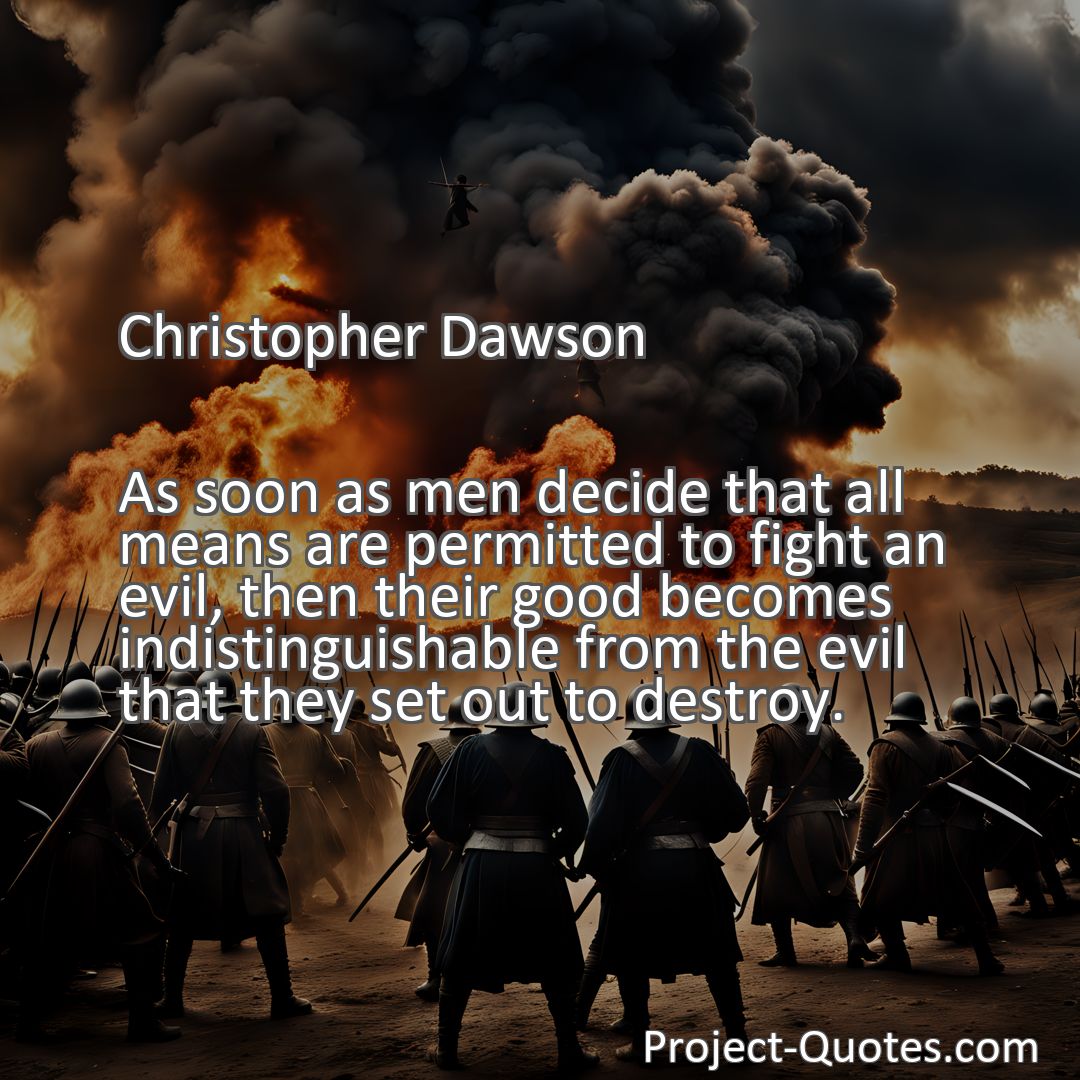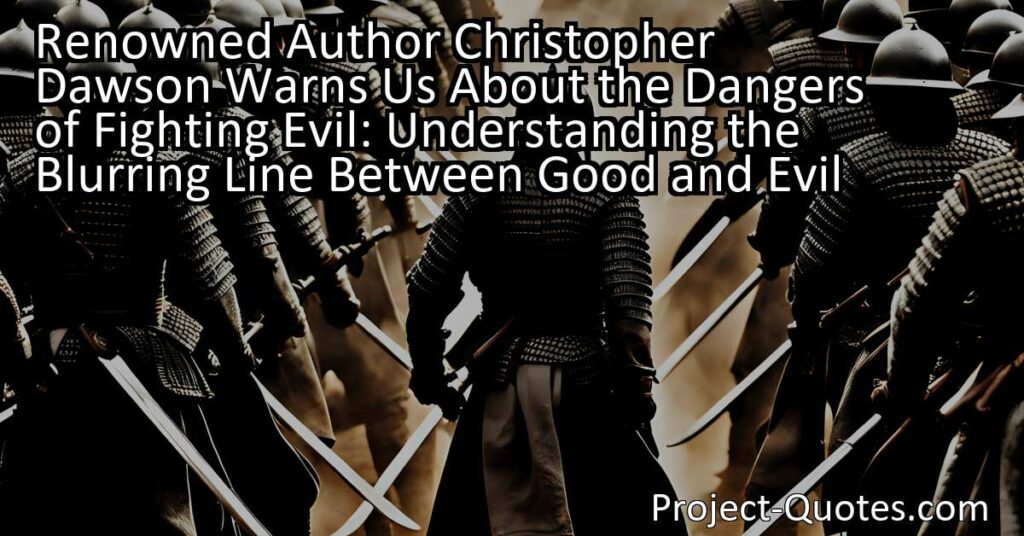As soon as men decide that all means are permitted to fight an evil, then their good becomes indistinguishable from the evil that they set out to destroy.
Christopher Dawson
Renowned author Christopher Dawson warns us about the dangers of losing sight of our moral principles while combating evil in today’s society. By employing any means necessary, the line between good and evil becomes blurred, leading to corruption and distortion of our original intentions. It is crucial to align our actions with our values and uphold the highest ethical standards to ensure our fight against evil remains just and true to our noble intentions.
Table of Contents
- 1 As soon as men decide that all means are permitted to fight an evil, then their good becomes indistinguishable from the evil that they set out to destroy.
- 2 Christopher Dawson
- 3 Meaning of Quote – As soon as men decide that all means are permitted to fight an evil, then their good becomes indistinguishable from the evil that they set out to destroy.
- 4 Freely Shareable Quote Image
- 5 Related
Meaning of Quote – As soon as men decide that all means are permitted to fight an evil, then their good becomes indistinguishable from the evil that they set out to destroy.
In today’s world, the concept of “fighting evil” seems to be prevalent in various aspects of society. From politics to personal relationships, there is often a strong inclination to combat what is perceived as wrong or harmful. However, renowned author Christopher Dawson warns us about the dangers of this approach in his powerful quote: “As soon as men decide that all means are permitted to fight an evil, then their good becomes indistinguishable from the evil that they set out to destroy.”
Dawson’s words carry a profound truth that transcends time and remain relevant in our contemporary society. At first glance, it may be tempting to dismiss his statement as an overgeneralization or an unrealistic ideal. But, by taking a deeper look at its implications, we can recognize the wisdom embedded within these words and learn valuable lessons about the nature of good and evil.
When individuals or groups engage in a battle against perceived evil, it is crucial to reflect on the means they employ to achieve their goals. Dawson’s warning serves as a reminder that the means we choose to pursue justice or righteousness play a significant role in determining the ethical value of our actions. If we allow all means to be permissible in our fight against evil, the line between good and evil begins to blur, ultimately leading to the corruption and distortion of our original intentions.
Looking back at history, we can find numerous examples wherein individuals or societies abandoned their principles in pursuit of a seemingly just cause. One such instance is the French Revolution. The revolutionaries, driven by a desire to overthrow an oppressive regime, resorted to extreme measures that resulted in violent executions, loss of innocent lives, and chaos. The initial goal of liberating the common people from tyranny slowly warped into a brutal power struggle, where any semblance of goodness became obscured by the very evil they sought to eradicate.
Nearer to our time, we can also observe this phenomenon in political and social movements. Often, groups advocating for a particular cause become so fixated on their mission that they become willing to employ any means necessary, regardless of their moral implications. As a result, these groups risk becoming mirror images of the very injustices they are fighting against. In such cases, Dawson’s warning comes to life, revealing the inherent danger of losing sight of our original purpose and allowing ourselves to justify unethical actions in the name of a greater good.
The erosion of moral boundaries in the fight against evil ultimately leads to a paradoxical situation. No longer able to distinguish between their good and the evil they set out to defeat, individuals and societies find themselves trapped within a cycle of perpetuating the very injustices they intended to confront. In essence, they become what they despise, and the initial noble cause becomes perverted and compromised. Therefore, it is essential to consider the means we employ, ensuring they align closely with the principles and values we strive to uphold.
However, it is important to acknowledge that the line between good and evil is not always clear-cut. Oftentimes, the complexities of the real world force us to make difficult choices and compromises. In these situations, a certain level of moral flexibility is necessary to navigate the myriad challenges we face. Nevertheless, Dawson’s quote serves as a reminder that the pursuit of justice or righteousness should never transcend our fundamental principles and the ethical boundaries that safeguard our actions.
To avoid falling into the trap described by Dawson, it is crucial to develop a strong moral compass, rooted in empathy, compassion, and a deep understanding of the consequences our actions may have on others. By genuinely embodying the goodness we strive for, we can significantly reduce the risk of becoming indistinguishable from the very evil we seek to eliminate.
In conclusion, Christopher Dawson’s quote serves as a profound reminder of the dangers that arise when individuals or societies lose sight of their moral principles while combating evil. It calls for a renewed focus on the means we employ, emphasizing the importance of aligning our actions with our values. As we navigate the complexities of the world, let us always bear in mind that our pursuit of good should never become entangled with the evil we aim to eradicate. Only by upholding the highest ethical standards can we ensure that our fight against evil remains just and true to our noble intentions.
I hope this quote inspired image brings you hope and peace. Share it with someone who needs it today!


